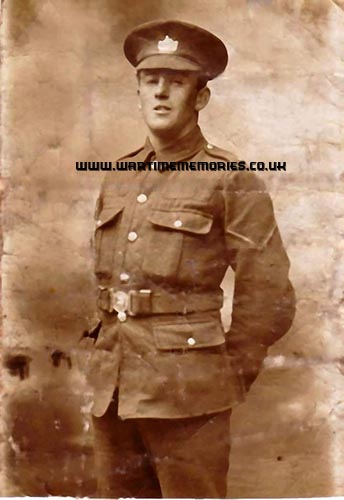Additions will be checked before being published on the website and where possible will be forwarded to the person who submitted the original entries. Your contact details will not be forwarded, but they can send a reply via this messaging system.
please scroll down to send a message
Pte. Frank Large
British Army 10th Battalion Gloucestershire Regiment
from:Greet, Cheltenham
My great-grandfather Frank Large, was a labourer and platelayer with Great Western Railways and joined up with the 10th Gloucesters on the 9th of August 1914 aged just 21. He was one of the first to answer Kitchener’s call to arms. He went to France in August the following year. To the best of my knowledge from paperwork and accounts told by my grandfather Herbert Large, he went over the top on the 25th of September 1915 at Loos. His pension records detail several interesting things I would like to share:
From family stories, he was one of the few to return to his village, where he found out that his fiancee had been killed by the Spanish flu. Whereas it was often the other way round for wives and fiancees to be left behind as the men were killed off. He returned and worked on the railways and raised a family. He never spoke a lot about the war as many did not, but towards the end he spoke to my grandfather and a few funny stories came out. Most of them were about the acquisition of alcohol through various means. I have his pension records, which are an interesting read. I have a copy of the War diaries for the 10th Gloucesters which is also interesting to read and details an inspection by the King. One of the most poignant facts I observed with the diaries is the change of handwriting as the war progresses and officers are killed, often with the new writer detailing his predecessor’s passing and the details.
- His records detail that he served in France for 38 months out of the 51 months the war ran.
- He was wounded in the left forearm by a bullet. My grandfather always said that the bullet went through his arm. Funnily enough, my grandfather was nicked by a bullet in the same arm in WW2 in the Far East with the Royal Marines.
- He received field punishment number one for being late on parade on at least one occasion; a few other times, he was confined to barracks.
- He was made lance corporal, but reverted to private at his own request.
- He is detailed as having moved to the 8th Gloucesters for a time.
- He is detailed as having worked as a stretcher bearer, or at least qualified as such as far as I can tell.
- He also was in the 74th Battalion of the Machine Gun Corps towards the end of the war. He has two service numbers, one for the Gloucesters and one for the MGC.
There was also a William Ingles who served with the 10th Gloucesters and won the DCM on the 25th of September but was killed two weeks later at the Hohenzollern redoubt. My great-great-grandmother’s maiden name was Ingles and I have often wondered if they were related somehow.
